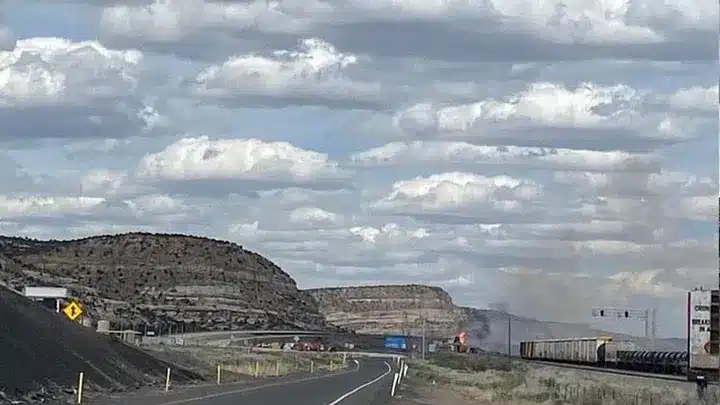
A freight train, laden with hazardous materials, careened off its tracks near the Arizona-New Mexico state line on Friday, resulting in a catastrophic derailment and subsequent inferno. The incident, which unfolded in the vicinity of Lupton, Arizona, triggered the closure of Interstate 40, a pivotal artery connecting major cities and facilitating the movement of goods and passengers across the region.
Eyewitnesses captured the chaos and devastation on social media, sharing images and videos of the mangled wreckage and towering flames that engulfed multiple rail cars. Despite the magnitude of the disaster, reports indicated no casualties or injuries resulting from the derailment, offering a semblance of relief amid the unfolding crisis.
In the aftermath of the derailment, personnel from BNSF Railway, the operator of the ill-fated train, scrambled to the scene to assess the extent of the damage and initiate emergency response efforts. Lena Kent, spokesperson for BNSF Railway, affirmed the company’s commitment to safety and vowed to conduct a thorough investigation to determine the underlying causes of the incident.
The closure of Interstate 40, a critical lifeline for commercial and commuter traffic, underscored the gravity of the situation, prompting authorities to implement detours and reroute vehicles to ensure the safety of motorists and travelers. Collaborative efforts between the New Mexico State Police and the Arizona Department of Public Safety facilitated the orderly diversion of traffic away from the hazardous zone, averting potential accidents and congestion on alternative routes.
The freight train’s cargo, comprising non-odorous propane and gasoline, exacerbated the perilous conditions as raging flames consumed several rail cars, casting plumes of thick smoke into the air and triggering environmental concerns. Phil Vargas, a lieutenant with the New Mexico State Police, acknowledged the challenges posed by the volatile cargo and outlined strategies to contain the blaze and minimize its impact on surrounding communities.
Preemptive evacuations of nearby residences and a truck stop underscored the urgency of the situation, as authorities sought to mitigate the risks posed by the unfolding disaster. Local firefighting crews mobilized swiftly to contain the spread of the fire and prevent its escalation, demonstrating resilience and solidarity in the face of adversity.
The ripple effects of the derailment reverberated beyond immediate transportation disruptions, impacting rail and passenger travel, with Amtrak canceling select routes, including vital connections between Los Angeles and Albuquerque, New Mexico. The cascading effects of the incident underscored the interconnectedness of transportation networks and the challenges inherent in managing crises of such magnitude.
As the closure of Interstate 40 persisted, the New Mexico Department of Transportation issued advisories warning motorists of extended highway closures and urging them to plan for alternative routes to navigate the congestion. Kristine Bustos-Mihelcic, a spokesperson for the department, emphasized the importance of patience and vigilance in navigating detours and cautioned against reckless driving amid heightened traffic volumes.
The Arizona Corporation Commission, vested with oversight of railroad safety within the state, provided insights into the scale of the derailment, confirming the involvement of ten rail cars, two of which were transporting liquid petroleum. Despite initial jurisdictional ambiguities, the commission pledged to deploy railroad inspectors to the site to assess the damage and ensure compliance with safety protocols.
As communities along the Arizona-New Mexico border grappled with the aftermath of the derailment, resilience, and solidarity emerged as guiding principles in confronting adversity and fostering recovery. The collaborative efforts of first responders, transportation agencies, and residents underscored the collective resolve to overcome challenges and safeguard the well-being of affected communities.
As investigations into the derailment continue, questions linger regarding the factors that precipitated the catastrophe and the efficacy of existing safety measures in mitigating such incidents. Calls for enhanced oversight and regulatory measures have intensified in the wake of the derailment, underscoring the imperative of proactive measures to prevent similar tragedies in the future.
The long-term implications of the derailment extend beyond immediate logistical disruptions, encompassing environmental concerns, economic ramifications, and implications for public safety. Efforts to restore normalcy and rebuild infrastructure in the aftermath of the disaster will require coordinated action and sustained investment in recovery efforts.
The freight train derailment near the Arizona-New Mexico border underscores the precarious nature of transporting hazardous materials and highlights the indispensable role of stringent safety measures and swift emergency responses.
As communities unite to navigate the aftermath, the incident stands as a poignant testament to human resilience in times of crisis. It serves as a clarion call for enhanced vigilance and proactive measures to safeguard against future disasters, emphasizing the need for ongoing investment in infrastructure resilience and disaster preparedness.
In the face of adversity, the collective resolve of affected individuals and organizations exemplifies the unwavering spirit of resilience and determination to overcome challenges and rebuild stronger, more resilient communities.








